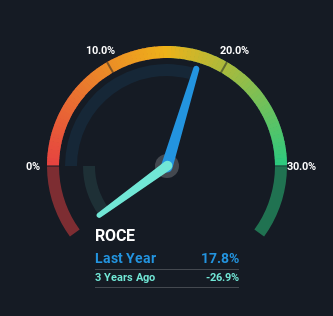- United Kingdom
- /
- Airlines
- /
- LSE:IAG
Investors Met With Slowing Returns on Capital At International Consolidated Airlines Group (LON:IAG)

If we want to find a stock that could multiply over the long term, what are the underlying trends we should look for? Typically, we'll want to notice a trend of growing return on capital employed (ROCE) and alongside that, an expanding base of capital employed. Put simply, these types of businesses are compounding machines, meaning they are continually reinvesting their earnings at ever-higher rates of return. That's why when we briefly looked at International Consolidated Airlines Group's (LON:IAG) ROCE trend, we were pretty happy with what we saw.
What Is Return On Capital Employed (ROCE)?
For those that aren't sure what ROCE is, it measures the amount of pre-tax profits a company can generate from the capital employed in its business. Analysts use this formula to calculate it for International Consolidated Airlines Group:
Return on Capital Employed = Earnings Before Interest and Tax (EBIT) ÷ (Total Assets - Current Liabilities)
0.18 = €3.7b ÷ (€38b - €17b) (Based on the trailing twelve months to March 2024).
Thus, International Consolidated Airlines Group has an ROCE of 18%. On its own, that's a standard return, however it's much better than the 11% generated by the Airlines industry.
See our latest analysis for International Consolidated Airlines Group

In the above chart we have measured International Consolidated Airlines Group's prior ROCE against its prior performance, but the future is arguably more important. If you'd like, you can check out the forecasts from the analysts covering International Consolidated Airlines Group for free.
What Does the ROCE Trend For International Consolidated Airlines Group Tell Us?
While the current returns on capital are decent, they haven't changed much. The company has employed 22% more capital in the last five years, and the returns on that capital have remained stable at 18%. 18% is a pretty standard return, and it provides some comfort knowing that International Consolidated Airlines Group has consistently earned this amount. Over long periods of time, returns like these might not be too exciting, but with consistency they can pay off in terms of share price returns.
On a side note, International Consolidated Airlines Group's current liabilities are still rather high at 45% of total assets. This can bring about some risks because the company is basically operating with a rather large reliance on its suppliers or other sorts of short-term creditors. Ideally we'd like to see this reduce as that would mean fewer obligations bearing risks.
The Bottom Line
The main thing to remember is that International Consolidated Airlines Group has proven its ability to continually reinvest at respectable rates of return. However, despite the favorable fundamentals, the stock has fallen 40% over the last five years, so there might be an opportunity here for astute investors. For that reason, savvy investors might want to look further into this company in case it's a prime investment.
On a final note, we've found 1 warning sign for International Consolidated Airlines Group that we think you should be aware of.
While International Consolidated Airlines Group isn't earning the highest return, check out this free list of companies that are earning high returns on equity with solid balance sheets.
New: AI Stock Screener & Alerts
Our new AI Stock Screener scans the market every day to uncover opportunities.
• Dividend Powerhouses (3%+ Yield)
• Undervalued Small Caps with Insider Buying
• High growth Tech and AI Companies
Or build your own from over 50 metrics.
Have feedback on this article? Concerned about the content? Get in touch with us directly. Alternatively, email editorial-team (at) simplywallst.com.
This article by Simply Wall St is general in nature. We provide commentary based on historical data and analyst forecasts only using an unbiased methodology and our articles are not intended to be financial advice. It does not constitute a recommendation to buy or sell any stock, and does not take account of your objectives, or your financial situation. We aim to bring you long-term focused analysis driven by fundamental data. Note that our analysis may not factor in the latest price-sensitive company announcements or qualitative material. Simply Wall St has no position in any stocks mentioned.
Have feedback on this article? Concerned about the content? Get in touch with us directly. Alternatively, email editorial-team@simplywallst.com
About LSE:IAG
International Consolidated Airlines Group
Engages in the provision of passenger and cargo transportation services in the North Atlantic, Latin America, the Caribbean, Europe, Africa, the Middle East, South Asia, the Asia Pacific, and internationally.
Undervalued with acceptable track record.
Similar Companies
Market Insights
Community Narratives



